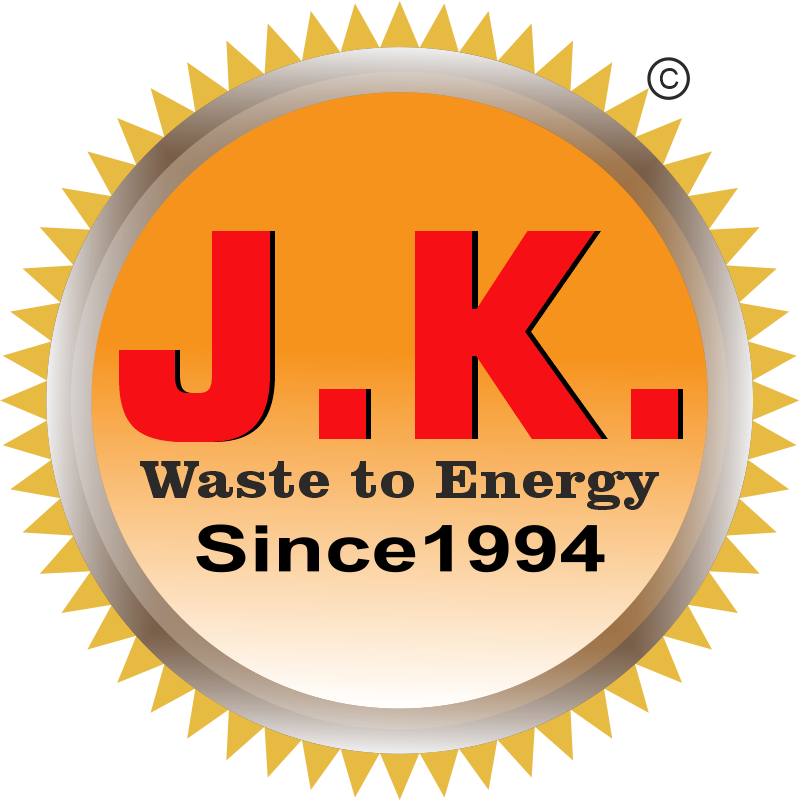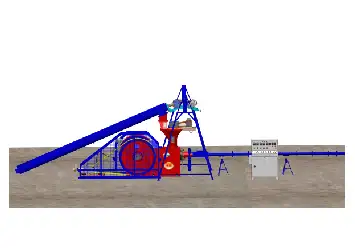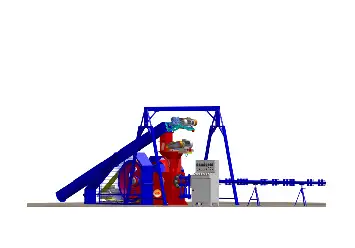The Biomass Briquetting Project is a sustainable initiative. It converts agro and forestry waste into biomass briquettes press.
This promotes eco-friendly and renewable energy. It is for a healthier environment and a thriving economy. Join us in this green energy venture today!
The Briquetting Machine converts agricultural and forest waste into top-notch Biomass Briquettes. It does not use binders or adhesives. These environmentally friendly briquettes offer a remarkable substitute for black coal and other fossil fuels. They foster sustainable heat generation practices.
Biomass Briquettes Press Machine
Agricultural waste for briquetting is a green and sustainable way to manage waste. Jay Khodiyar is a renowned manufacturer in the industry. They offer a wide range of Briquetting Plants and Briquetted White Coal. We make these products with the utmost precision and adherence to global standards.
The JK 90 is one of their top-performing and cost-effective briquette machines. The design specifically caters to users with many high-density raw materials. This biomass briquetting machine ensures optimal performance and exceptional quality. It’s a popular choice among customers.
The versatility of the briquette press machine is another advantage. It can effectively convert various types of raw materials into biomass briquettes.
These materials include agricultural waste and forest waste. This opens up a world of possibilities for industries and individuals. They can reduce their carbon footprint and air pollution. They can also contribute to a greener future.
Briquette Manufacturing Process
Raw Materials Collection
This step is crucial for making biomass briquettes. The process begins at the briquette plant, where waste from agriculture and forests is collected. This biomass waste then serves as the primary raw material for making the briquettes.
Crushing
The next step in making briquettes is crushing. In this step, the biomass briquettes raw materials are broken down into smaller sizes that fit the requirements of the briquetting machines. Different machines like chipper grinders, shredders, and hammer mills are used depending on the initial size of the raw materials.
Drying
The next step is to reduce the moisture content of the raw material since briquetting requires a moisture level of only 8-12%. Depending on how wet and large the raw material is, flash dryers or rotary dryers are used to remove excess moisture.
Compacting
The machine compresses the raw material using a high-pressure mechanical punch and pushes it into a briquette mold. This high pressure releases the natural adhesive in the raw material, helping it bind together into a solid briquette.
Shaping
The last step in making briquettes at a briquette plant is to shape them into the desired cylindrical form. This is done using dies, split pipes, and briquette cooling lines to achieve the proper shape.
Packaging of Briquettes
After passing through the cooling line, the final briquettes are ready for use. They are then either packaged or sold loose, depending on their intended application. The price of the briquettes varies based on the type of raw material used to produce them.
Briquette Making Machine – Raw Materials
Forest Waste: Saw Dust, Sandar Dust, Wood chips, Tree bark, Pine needles, Wild grasses, Shrubs and Bamboo leaves, Bamboo dust, Viner waste, Wood peeling waste, etc. can be used for briquetting.
Agricultural Waste: Rice husks, Sunflower, Groundnut shells, Almond shells, Coconut shells, Cotton stalks, Arhar stalks, Sugar cane leaves/trash, Mustard stalks, Bajra cobs, Coir dust, Paddy straw, Wheat straw and Mentha Plant waste, Maize plant waste, Corn cob waste, Coffee waste, Tea waste, etc. can be used for briquetting.
Waste: Paper Waste, Bagasse, Municipal Solid Waste, Rdf, Coffee Waste, Etc.
Briquetting Machine Manufacturer – Jay Khodiyar
Jay Khodiyar is an esteemed manufacturer, exporter, and provider. They offer a distinctive selection of biomass Briquetting Plant and Briquetted White Coal. They use superior raw materials and advanced technology.
JK 90 is best suited for those users who have a bulky density of raw material. Our briquette press machine is best known for its performance and quality. One can use various types of raw materials to make biomass briquettes, such as agricultural and forest waste.
Briquetting Machine Technical Specifications:
Finish Good Shape:
Cylindrical
Finish Good Diameter:
90mm
Briquettes Length
50 mm – 450 mm
Raw Material in feed Size:
1mm x 5mm x 12mm
Bulk weight
50 – 250 kg/m3
Raw Material Moisture:
8-12%
Power Required:
91 HP
Production Capacity
900 to 2000 Kg/Hr 10% ± (*The production capacity depends on the density of the raw material.)
Advantages of Briquetting Machine – JK90
The mechanical briquetting press develops a compression force of approximately 2000 kg/cm Bar to obtain a high quality briquette of a high density and a remarkably reduced volume, without the addition of binders.
- High reliability and long operational lifetime
- Extremely low maintenance and operating costs
- Significant volume reduction ratio
- Reduction of handling and transportation costs
- Safety sensor feature
- Auto cut-off feature


